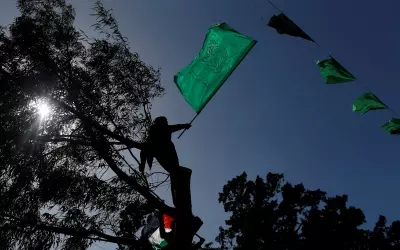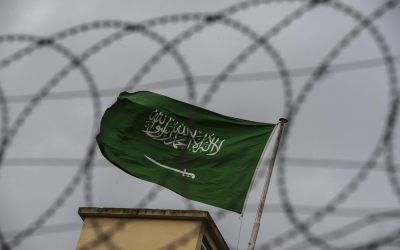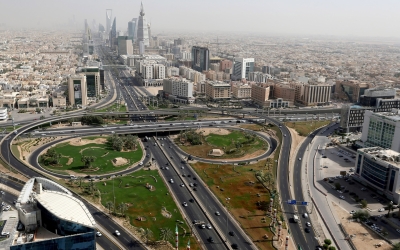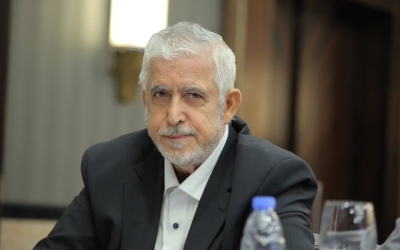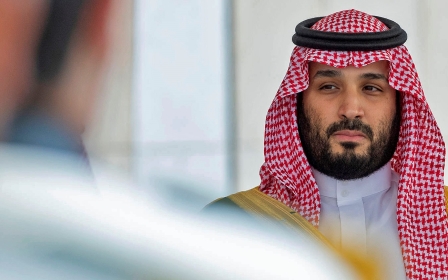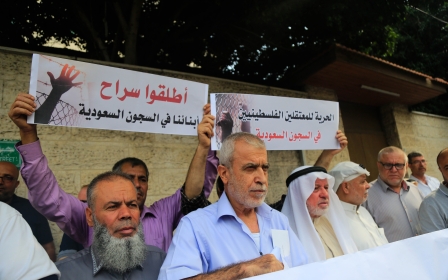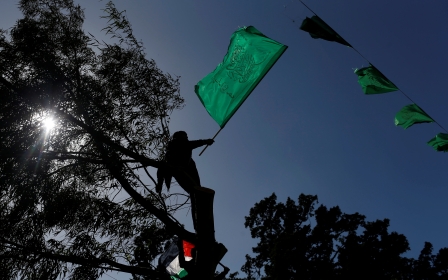Saudi Arabia: Relatives of Hamas supporters sentenced in mass trial hope for royal pardon
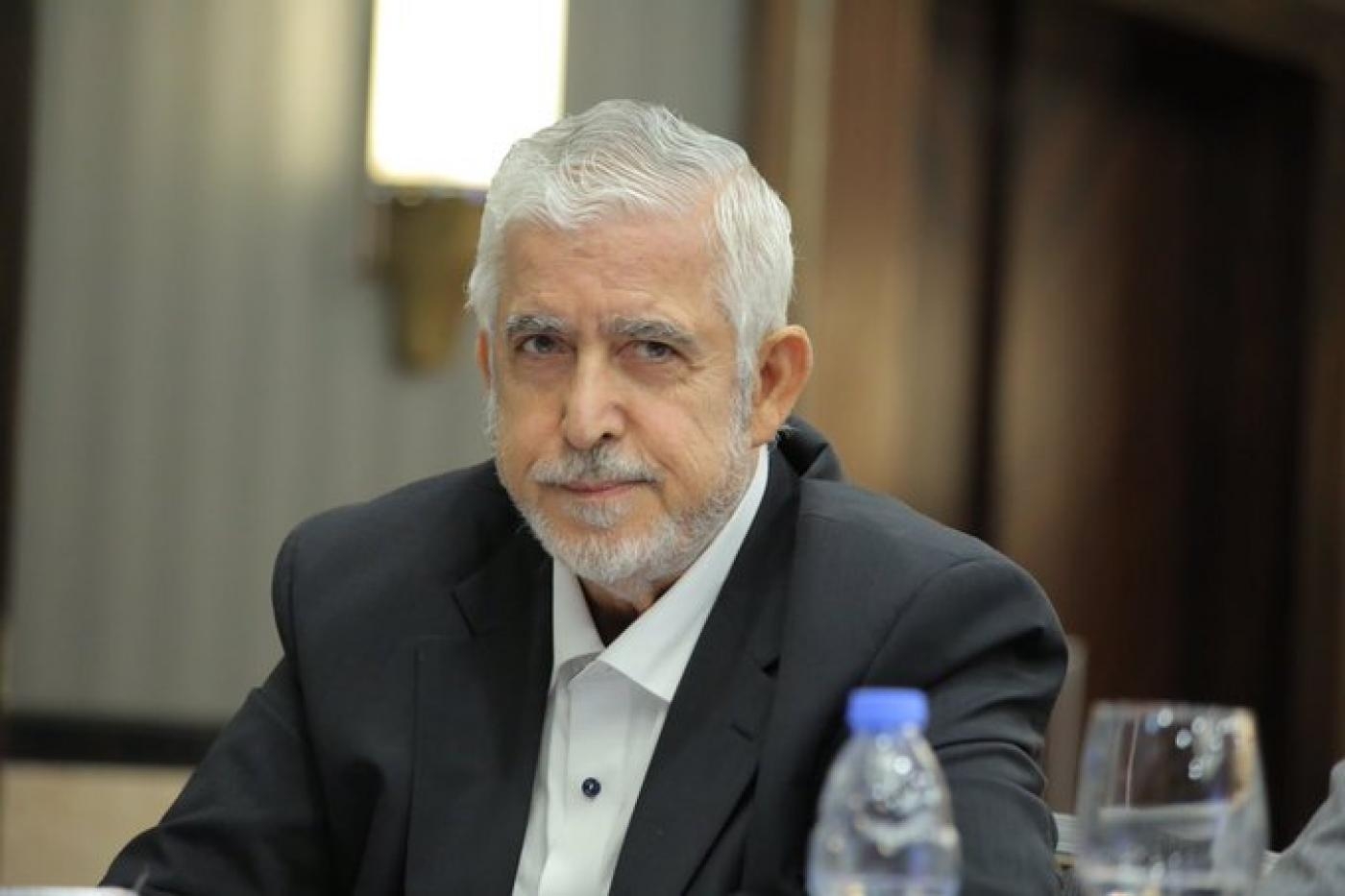
Nearly two years after the arrest of scores of Palestinian and Jordanian citizens in Saudi Arabia, a Saudi court sentenced the detainees on Sunday over their alleged involvement with the Hamas movement, in a ruling that Hamas and Palestinian factions have described as "political and cruel".
The court decision came on the heels of several failed mediation attempts - including a prisoner swap proposal by Houthi rebels in Yemen.
The Saudi court handed down prison sentences to 64 Palestinians and Jordanians ranging from six months to 22 years, while another five detainees were acquitted of charges of belonging to Hamas and "supporting terrorism".
The most prominent prisoner, the former Hamas representative in Saudi Arabia Mohammed al-Khoudary, was initially sentenced to 15 years in prison, only for the sentence to be halved due to the 82-year-old’s ill health. Meanwhile, fellow Palestinian Mohammed Al-Abed received the highest sentence of 22 years.
Only one relative per detainee was allowed to attend the hearing, the families said, with several family members reportedly fainting as the lengthy sentences were announced.
The sentencing hearing came shortly after Palestinian and Jordanian calls for the detainees to be released. Hamas politburo chief Ismail Haniyeh had even issued an appeal to the Saudi king, Salman bin Abdulaziz, to release the prisoners in remembrance of the “previous historical positions of the kingdom” in support of the Palestinian people and their cause.
While Hamas takes stock of its possible response to the news, families of detainees who live in Gaza are in shock over a development that many saw as unexpected.
Mediation deadlock
The ruling was received with anger in the besieged Gaza Strip and Jordan. The campaign calling for Freedom for Khoudary and Palestinian Detainees in Saudi Arabia in Gaza, as well as the Committee for Jordanian Detainees in Saudi Arabia, announced that they would appeal the verdicts in 40 days, as stipulated by the court's decision.
Sources in Hamas and close to the Khoudary family in Gaza told Middle East Eye (MEE) that talks between Hamas and Saudi Arabia had reached a deadlock in July after Hamas refused to compromise on political issues in exchange for Saudi leniency in the case.
Nonetheless, Hamas was reportedly shocked by the decision to expedite the sentencing - initially scheduled for October - especially after an appearance by Hamas chief Khaled Meshaal on Saudi channel Al-Arabiya a couple of weeks prior that seemed to hint at a thawing of relations between Riyadh and the Palestinian movement.
In a press statement following the sentencing, Mustafa Nasrallah, the attorney for a number of the imprisoned Palestinians and Jordanians, said: "all detainees must be acquitted by the court of appeals if the Saudi judiciary is to be cherished in the future."
"One hopes that the Court of Appeal will return the case back on the correct legal track and release all detainees,” Nasrallah added. “These are unfair and illegal rulings that violate the most basic legal and judicial verdicts."
Nasrallah denounced an absence of the "principles of a fair trial" on behalf of the Saudi court.
"The detainees did not commit any criminal act under the law," he explained, saying that many of the charges the prisoners were accused of, including helping fundraise for Hamas inside Saudi Arabia, were "legitimate according to Saudi law (...) and even if the law is amended later, people may not be tried retroactively".
In its first official comment on the verdict, Hamas said that the "large number of Palestinian and Jordanian brothers" put on trial had "not committed anything that required these cruel and unjustified sentences, let alone a trial”.
“All they did was support their cause and their people, without causing offence to the (Saudi) kingdom and its people,” the statement added.
Bassem Naim, the head of Hamas' international relations office, said that the movement rejected the "cruel, unjust and unjustified verdicts”, calling them “political sentences".
"The movement's leaders in Saudi Arabia have been working with the knowledge of its officials and in coordination with them for many years," Naim told MEE. “Hamas did not expect such provisions.”
Naim put the sentences in the context of "the changes currently taking place in the region", alluding to several Arab states’ normalisation of diplomatic relations with Israel.
While Saudi Arabia has no official ties with Israel, Crown Prince Mohammed bin Salman is widely believed to be leading efforts to normalise his country’s relationship with Tel Aviv.
Tense relations
The relationship between Hamas and Saudi Arabia dates back to the beginning of the movement's rise during the First Intifada in December 1987.
A number of its founders and close associates lived in the Gulf kingdom where large donation campaigns were launched for the movement and its charitable institutions, some with the official Saudi blessing.
For observers, the arrests mark a sharp shift in the relationship between Riyadh and Hamas, coinciding with the rise of the Saudi crown prince.
Mustafa al-Sawaf, a Palestinian columnist close to Hamas, believes that the movement’s relationship with Riyadh has been strained by "changes in the political leadership system in Saudi Arabia, which seeks American and Zionist approval".
"Hamas’ political will and policies serve the cause, the people, and the national project, and it establishes its relations with others according to the interests that serve the Palestinian people,” Sawaf told MEE. "Therefore, bargaining conditions and blackmail are not accepted by Hamas.”
According to Sawaf, the case of the detained Palestinians and Jordanians was used to pressure Hamas into severing its ties to Iran, Riyadh’s regional archnemesis, and Lebanon’s Hezbollah movement.
"It is not permissible for anyone to specify that Hamas establish relations here or there, or that its relations be with one party at the expense of another," he said.
However, the journalist said the Palestinian movement was still hoping to resolve the issue through diplomacy.
"Hamas will not declare war on Saudi Arabia, but will seek through mediators to pressure King Salman into issuing a comprehensive amnesty for these innocent people... instead of the shame that befell Saudi Arabia as a result of this crime of a trial,” he said.
Families in shock
Meanwhile, in the besieged Gaza Strip, where Hamas is the de facto ruling party, the Khoudary and Abed families were dismayed upon receiving news of the sentencing.
Abdulmajid al-Khoudary, Khoudary’s brother, told MEE that the elderly man had had good relations with the Saudi leadership when he retired from his position as Hamas representative to Saudi Arabia in 2010, nine years before his detention.
Abdulmajid said the family had hoped that the court would let Khoudary out for time served, given his cancer diagnosis and lack of involvement with Hamas at the time of his arrest.
"It is sad that our brothers in the kingdom do this,” Abdulmajid said. “Dr. Mohammed did not commit any offense or crime but was serving Saudi Arabia as his second homeland.
"What happened is reprehensible, these are orders given from outside," he claimed, adding that Khoudary’s daughter, who holds US citizenship, was seeking to appeal directly to King Salman through the Saudi embassy in Washington for him to issue a royal pardon for her sick father.
Abu Muslim al-Abed, the nephew of detainee Mohammed al-Abed, told MEE that his 67-year-old uncle had lived in Saudi Arabia for 35 years, working for many years as an engineer in the state-owned Saudi Electricity Company, and fostering good relations with Saudi princes and leaders.
Abu Muslim said information regarding Abed’s case was hard to come by for the prisoner’s family in Gaza due to Saudi security restrictions, as well as Saudi-based relatives’ fears that phone lines may be tapped.
Despite the sentencing, however, Hamas leadership has expressed optimism that a royal pardon may still be possible.
"We believe that an opportunity is still likely to close the file of detainees in Saudi Arabia,” Meshaal said in a recording addressed to the families of the detainees. “We hope for a political step through which we will overcome this crisis."
Middle East Eye delivers independent and unrivalled coverage and analysis of the Middle East, North Africa and beyond. To learn more about republishing this content and the associated fees, please fill out this form. More about MEE can be found here.


